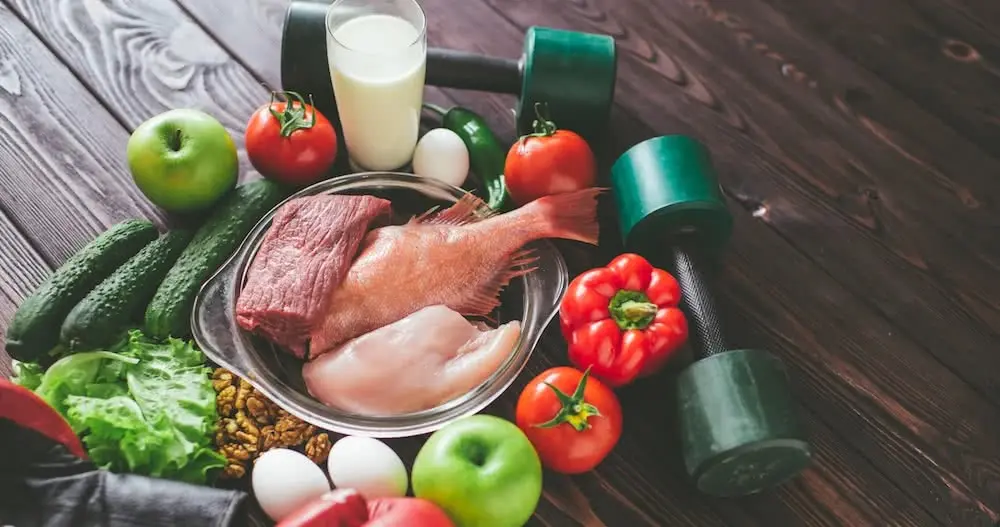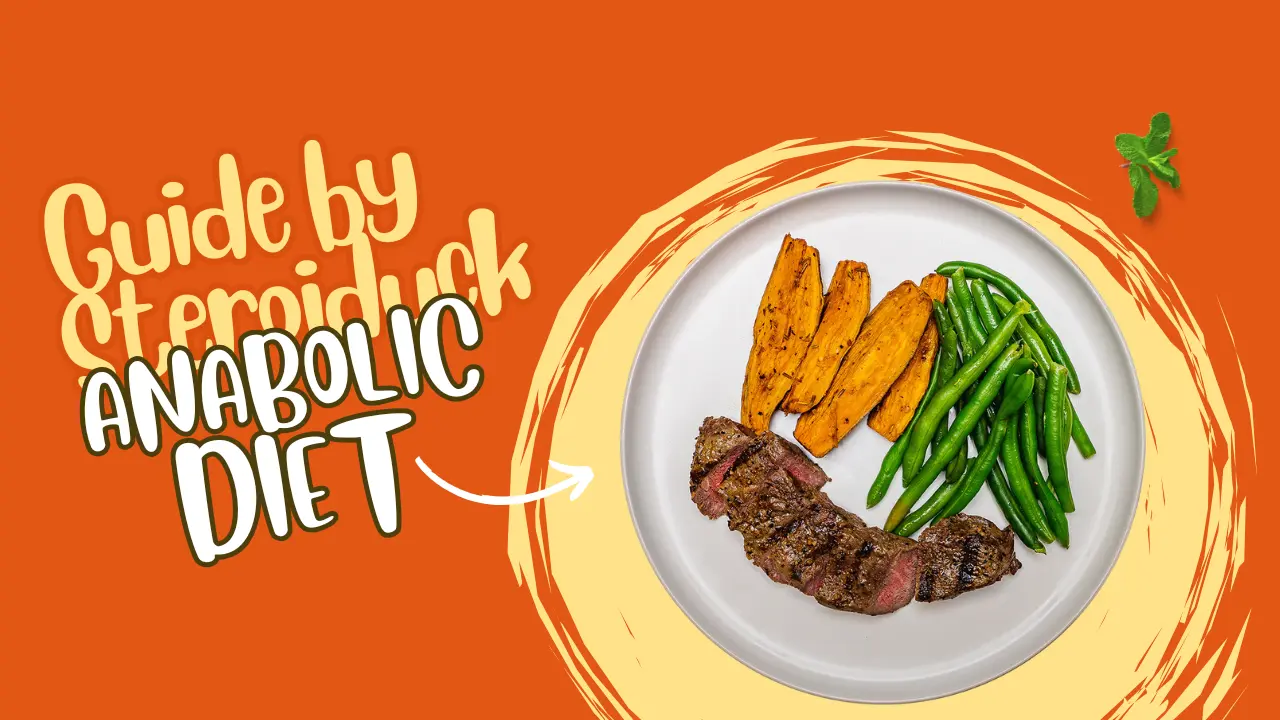The anabolic diet is a nutritional approach designed to maximize muscle mass while promoting weight loss. This diet plan revolves around manipulating carbohydrate intake throughout the week, with a focus on high-fat, high-protein meals during weekdays and carb-loading on weekends.
During the low-carb phase, which typically lasts five days, followers of the anabolic diet consume a high amount of protein and healthy fats while keeping carbohydrate intake to a minimum. This phase aims to shift the body’s metabolism towards fat-burning and enhance testosterone production. Foods rich in protein and healthy fats, such as meats, eggs, fish, nuts, and oils, form the foundation of meals during this period.
The high-carb phase, usually lasting two days, allows for a significant increase in carbohydrate consumption. This sudden influx of carbs replenishes glycogen stores, which can help fuel intense workouts and support muscle growth. During this phase, individuals can enjoy foods like fruits, whole grains, and starchy vegetables that are typically limited during the low-carb days.
One of the key principles of the anabolic diet is maintaining an appropriate caloric intake to support muscle growth while promoting fat loss. This often involves calculating and tracking daily calorie needs based on factors such as body weight, activity level, and fitness goals. Protein intake is particularly crucial, with recommendations typically ranging from 1.6 to 2.2 grams per kilogram of body weight per day to support muscle protein synthesis and recovery.
The anabolic diet shares some similarities with other nutritional approaches, such as the cyclical ketogenic diet and carb cycling. However, it differs in its specific macronutrient ratios and timing of carbohydrate consumption. Some people may confuse the anabolic diet with steroid diets for cutting or bulking, but it’s important to note that the anabolic diet is a natural approach that doesn’t involve the use of performance-enhancing substances.
To optimize results on the anabolic diet, it’s crucial to focus on consuming nutrient-dense, anabolic foods. These include high-quality protein sources like lean meats, fish, and eggs, as well as healthy fats from sources such as avocados, nuts, and olive oil. During the high-carb phase, complex carbohydrates from whole grains and starchy vegetables are preferred over simple sugars.
While the anabolic diet can be effective for some individuals, it’s important to note that it may not be suitable for everyone. As with any significant dietary change, it’s advisable to consult with a healthcare professional or registered dietitian before starting the anabolic diet, especially for those with pre-existing health conditions or specific nutritional needs.
The Anabolic Diet Principles

Definition and creator
The anabolic diet, created by Dr. Mauro DiPasquale, is a nutritional approach designed to maximize muscle mass while promoting weight loss. As a physician and competitive powerlifter, DiPasquale developed this diet for individuals aiming to gain substantial muscle mass while maintaining low body fat levels. He named it the anabolic diet because he believed that carbohydrate cycling could mimic the effects of anabolic steroids.
Macronutrient cycling
The anabolic diet is based on alternating low-carb and high-carb days, a concept known as macronutrient cycling. During weekdays, followers consume a high-fat, high-protein diet with minimal carbohydrates. On weekends, they switch to a high-carbohydrate intake. This cycling approach is thought to enhance fat burning while preserving muscle mass.
The weekday phase focuses on limiting carbohydrate intake to no more than 30 grams per day, with caloric intake primarily coming from fat and protein. Ideally, the breakdown should be 60 to 65 percent fat, 30 to 35 percent protein, and 5 to 10 percent carbohydrates . This low-carb phase aims to shift the body’s metabolism towards fat-burning and boost testosterone production.
During the weekend phase, designed to replenish carbohydrate stores, 60 to 80 percent of calories should come from carbohydrates, with 10 to 20 percent from fat and 10 to 20 percent from protein. This sudden influx of carbs helps refuel glycogen stores, potentially supporting intense workouts and muscle growth.
Phases of the diet
The anabolic diet is delivered in three distinct phases, each designed for specific goals:
- Maintenance/Induction Phase: This initial phase typically lasts for weeks one to four. The caloric intake is calculated by multiplying body weight in pounds by 18. This phase allows the body to adapt to the low-carb intake and serves as a maintenance level throughout the diet.
- Bulk Phase: Following the induction phase, the bulk phase aims to achieve a desired bulk weight. There’s no set duration for this phase, as followers are encouraged to continue until they reach their target weight. Dr. DiPasquale suggests using the ideal body weight in pounds and adding 15 percent to determine the bulk weight goal.
- Cutting Phase: This phase is essentially a low-carb weight loss plan. It involves reducing 500 to 1,000 calories from the maintenance phase calorie intake. The cutting phase continues until the desired body fat percentage is achieved, preferably less than 10 percent.
Throughout all phases, the anabolic diet maintains its core principle of macronutrient cycling between low-carb weekdays and high-carb weekends. This approach is believed to prevent the body from reverting to primarily burning carbs for fuel while allowing for replenishment of energy stores lost during vigorous exercise.
How to implement Low-Carb Weekdays
Implementing low-carb weekdays is a crucial aspect of the anabolic diet. This phase aims to shift the body’s metabolism towards fat-burning and enhance testosterone production. To successfully follow this part of the diet, individuals need to focus on specific food choices, meal planning, and consider certain supplements.
Recommended food choices
During the low-carb phase, which typically lasts five days, followers of the anabolic diet should consume a high amount of protein and healthy fats while keeping carbohydrate intake to a minimum. The goal is to limit carbohydrates to no more than 30 grams per day. Foods rich in protein and healthy fats should form the foundation of meals during this period.
Recommended food choices include:
- Lean meats such as beef, pork, chicken, and turkey
- Fish, especially fatty varieties like salmon and tuna
- Eggs (whole eggs, egg whites, and yolks)
- Non-starchy vegetables, particularly leafy greens like spinach, broccoli, and cauliflower
- Nuts and seeds, including almonds, walnuts, sunflower seeds, and chia seeds
- High-fat dairy products like cheese, butter, and heavy cream
- Healthy oils such as olive oil, coconut oil, and avocado oil
It’s important to note that during this phase, individuals should avoid or significantly limit their intake of starchy vegetables, fruits, whole grains, and legumes due to their higher carbohydrate content.
Meal planning tips
To successfully implement low-carb weekdays, proper meal planning is essential. Here are some tips to help:
- Calculate your daily calorie needs based on factors such as body weight, activity level, and fitness goals.
- Aim for a macronutrient breakdown of 60-65% fat, 30-35% protein, and 5-10% carbohydrates.
- Prepare meals in advance to ensure you have low-carb options readily available throughout the week.
- Include a variety of protein sources in your meals to prevent boredom and ensure a balanced nutrient intake.
- Incorporate non-starchy vegetables into each meal to increase fiber intake and provide essential vitamins and minerals.
- Use herbs and spices to add flavor to your meals without increasing carbohydrate intake.
Supplements to consider
While following the low-carb phase of the anabolic diet, certain supplements may be beneficial to support muscle growth and overall health. Some supplements to consider include:
- Whey protein: This can help meet protein requirements and support muscle protein synthesis.
- Creatine: It may enhance muscle strength and power during workouts.
- Omega-3 fatty acids: These can support heart health and reduce inflammation.
- Multivitamin: To ensure adequate micronutrient intake, especially when limiting certain food groups.
- Electrolytes: These may help prevent imbalances that can occur during the initial adaptation to a low-carb diet.
It’s important to consult with a healthcare professional or registered dietitian before starting any new supplement regimen, especially when making significant changes to your diet.
Maximize effects of High-Carb Weekends
The high-carb weekends are a crucial component of the anabolic diet, designed to replenish muscle glycogen stores and support muscle mass growth. To maximize the effects of these carb-loading periods, it’s essential to follow specific strategies and choose the right carbohydrate sources.
Carb loading strategies
During the high-carb phase, which typically lasts for 36-48 hours, the goal is to consume 60-80% of calories from carbohydrates. This sudden influx of carbs has a significant impact on the body’s hormonal environment, potentially enhancing muscle growth and recovery. To optimize this phase, it’s recommended to divide it into three distinct periods:
- Initial 6-hour window: This period allows for the consumption of a wide variety of carbohydrates, including some higher-glycemic options.
- 12-18 hour glycogen supercompensation: Focus on complex carbohydrates to maximize muscle glycogen storage.
- 4-6 hour transition: Incorporate more dietary fiber and slightly increase fat intake to prepare for the return to the low-carb phase.
Best carbohydrate sources
Choosing the right carbohydrate sources is crucial for maximizing the benefits of the high-carb weekends. While there’s more flexibility compared to the low-carb days, it’s still important to prioritize nutrient-dense options. Some excellent choices include:
- Whole grains: Quinoa, oats, and buckwheat are rich in nutrients and fiber.
- Starchy vegetables: Sweet potatoes and white potatoes provide complex carbohydrates.
- Fruits: Bananas, apples, and berries offer natural sugars and antioxidants.
- Legumes: Kidney beans and chickpeas provide both carbohydrates and protein.
Avoiding common pitfalls
To ensure the high-carb weekends contribute to muscle mass gain rather than unwanted weight gain, it’s important to avoid these common mistakes:
- Overindulging: While the carb-up period allows for higher carbohydrate intake, it’s not a free pass to consume unlimited junk food.
- Neglecting protein: Maintain adequate protein intake to support muscle protein synthesis.
- Ignoring timing: Consider consuming more carbohydrates later in the day to promote better sleep and hormone balance.
- Failing to adjust workout intensity: Reduce exercise volume during the carb-loading phase to maximize glycogen storage.
By following these strategies and avoiding common pitfalls, individuals can harness the anabolic diet’s potential to enhance muscle mass and improve overall body composition.
Optimize Your workout for Muscle Gain
Training frequency and intensity
To maximize muscle gain on the anabolic diet, it’s crucial to focus on training frequency and intensity. Compound weight lifting exercises are considered the best form of anabolic training. These exercises engage multiple muscles and joints simultaneously, recruiting more muscle fibers and activating the central nervous system more effectively than single-joint exercises. Exercises like squats, presses, deadlifts, and pull-ups stimulate anabolic training and lead to greater protein synthesis.
Intense workouts involving heavy weights and short rest periods boost metabolism and increase muscle-building hormones while decreasing the production of catabolic hormones. However, it’s important to note that longer workouts can lead to a more catabolic state. To maintain an anabolic state, aim for workouts lasting no more than 45 minutes to avoid an increase in cortisol, a stress hormone that promotes catabolism.
Exercise selection for maximum anabolism
Choosing the right exercises is crucial for putting your body in an anabolic state to build muscle mass. Barbell and dumbbell exercises are often the tools of choice for maximizing muscle growth. These exercises allow for progressive overload, which is essential for continual muscle growth.
To optimize anabolic training, focus on exercises that apply stress to the muscle and lead to muscle tissue breakdown. This overload principle is key to triggering protein synthesis and muscle growth. By incorporating exercises that target multiple muscle groups, you can stimulate a greater anabolic response and maximize your muscle-building potential.
Recovery techniques
Recovery plays a vital role in optimizing your workout for muscle gain. After intense exercise, the body is often in a catabolic state, releasing hormones that pull fuel from the liver, fat, and muscles. To halt this breakdown and promote an anabolic state, consume a combination of carbohydrates and protein within 30-60 minutes after exercise.
Active recovery can be beneficial for metabolic recovery and muscle repair. Activities like walking, cycling, or swimming at 30-60% of your maximum heart rate can increase blood flow to muscle tissue, aiding in repairs. Massage is another effective recovery technique for reducing delayed onset muscle soreness (DOMS).
Adequate sleep is crucial for metabolic recovery and glycogen replenishment. Aim for seven to nine hours of sleep, especially when exercising intensely. Sleep deprivation can reduce muscle glycogen levels by nearly 25%, potentially impacting your muscle-building efforts.
By implementing these strategies for training frequency, exercise selection, and recovery techniques, you can optimize your workout routine to maximize muscle gain while following the anabolic diet.
Summary
The anabolic diet has a significant influence on muscle growth and fat loss through its unique approach to macronutrient cycling. By alternating between low-carb weekdays and high-carb weekends, this diet aims to boost fat burning while preserving muscle mass. The diet’s focus on consuming nutrient-dense foods, along with proper meal planning and supplementation, can help individuals to achieve their fitness goals more effectively. What’s more, when combined with a well-designed workout routine that includes compound exercises and proper recovery techniques, the anabolic diet can lead to substantial improvements in body composition.
To wrap up, the anabolic diet offers a structured approach to nutrition that can be beneficial for those looking to build muscle and lose fat. However, it’s crucial to remember that this diet may not be suitable for everyone, and it’s always a good idea to consult with a healthcare professional before making major changes to your eating habits. By understanding the principles of the anabolic diet and applying them correctly, individuals can harness its potential to enhance their physical performance and overall health.
FAQs

What are the guidelines for following the anabolic diet?
The anabolic diet recommends a macronutrient distribution of 60 to 65 percent fats, 30 to 35 percent proteins, and 5 to 10 percent carbohydrates. The diet involves a low-carbohydrate intake for five days followed by a high-carbohydrate intake during the weekends to replenish the body’s carbohydrate stores.
Which diet is most effective for gaining muscle?
For optimal muscle gain, a clean bulk diet is advisable, focusing on a balanced intake of healthy fats, carbohydrates, and proteins. Ideal food choices include chicken, shrimp, eggs, salmon, brown rice, quinoa, sweet potatoes, and various fruits.
What is considered the most anabolic food?
Foods that are most conducive to muscle building are those high in protein, complex carbohydrates, and healthy fats. Key examples are lean meats, fish, nuts, seeds, beans, and whole grains. Additionally, fresh vegetables and fruits provide essential vitamins, minerals, and antioxidants that support muscle growth and recovery.
What are the different stages of the anabolic diet?
The anabolic diet consists of three main phases: the induction phase, the bulking phase, and the cutting phase. Each phase plays a crucial role in optimizing the diet’s effectiveness for muscle gain and fat loss.
References
[1] – https://www.healthline.com/health/food-nutrition/anabolic-diet
[2] – https://www.issaonline.com/blog/post/building-muscle-how-to-get-your-body-in-an-anabolic-state
[3] – https://www.muscleandfitness.com/workouts/full-body-exercises/8-best-anabolic-exercises/
[4] – https://www.beachbodyondemand.com/blog/how-to-metabolic-recovery
[5] – https://www.levels.com/blog/a-guide-to-exercise-recovery-and-metabolic-health
Dr. Grant Fourie, a specialist in male hormones, is based in Cape Town, South Africa. He provides comprehensive treatments for conditions related to low testosterone, such as erectile dysfunction, fatigue, and mood changes. His methods include hormone replacement therapy and other modern treatment options.
Contact me via email or phone to book personal appointment in my clinic: The Village Square, Cape Town - South Africa







